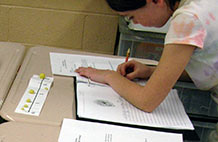Are literacy skills really included?

Inquiry Project curricula and literacy connections are very strong! Students write and talk about their work in every science class and writing, speaking and listening are part of the Common Core English Language Arts Standards in Grades 3, 4, and 5.
Writing
Inquiry Project students write in their science notebooks in every science class. Their writing is aligned with English Language Arts standards. For example: When students record their predictions, they are writing opinion pieces on a specific science topic and supporting their point of view with reasons. When they write reflections, they are writing explanatory texts to convey ideas and information clearly. When students are asked to answer questions their notebooks, they are also asked to explain their reasoning. Students write claims and describe the supporting evidence. They make drawings and add annotations to explain their ideas about processes they cannot observe directly.
Students’ science writing is connected to specific (and important) Common Core ELA Standards:
- W.3.1 Write opinion pieces on topics or texts, supporting a point of view with reasons
- W.4.1 and W.5.1 Write opinion pieces on topics or texts, supporting a point of view with reasons and information
- W.3.2, W.4.2 and W.5.2 Write informative/explanatory texts to examine a topic and convey ideas and information clearly
- W.4.4 and W.5.4 Produce clear and coherent writing in which the development and organization are appropriate to task, purpose, and audience
Speaking and Listening
In Inquiry curricula, speaking and listening are referred to as “talk” or “discussion” or “making meaning.” Speaking and Listening standards are very closely aligned with the goals and norms for Inquiry Project discussions.
SL.3.1 Engage effectively in a range of collaborative discussions (one-on-one, in groups, and teacher-led) with diverse partners on grade 3 topics and texts, building on others’ ideas and expressing their own clearly.
- Come to discussions prepared, having read or studied required material; explicitly draw on that preparation and other information known about the topic to explore ideas under discussion.
- Follow agreed-upon rules for discussions (e.g., gaining the floor in respectful ways, listening to others with care, speaking one at a time about the topics and texts under discussion).
- Ask questions to check understanding of information presented, stay on topic, and link their comments to the remarks of others.
- Explain their own ideas and understanding in light of the discussion.
SL4.1 and SL5.1 are similar with appropriately more sophisticated expectations.



